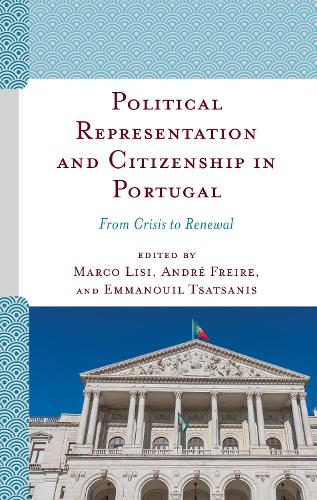
Political Representation and Citizenship in Portugal: From Crisis to Renewal
(Hardback)
Publishing Details
Political Representation and Citizenship in Portugal: From Crisis to Renewal
By (Author) Marco Lisi
Edited by Andr Freire
Edited by Emmanouil Tsatsanis
Contributions by Guya Accornero
Contributions by Ana Maria Belchior
Contributions by Enrico Borghetto
Contributions by Joo Cancela
Contributions by Augusta Correia
Contributions by Elisabetta De Giorgi
Contributions by Andr Freire
Bloomsbury Publishing PLC
Lexington Books
10th June 2020
United States
Classifications
Professional and Scholarly
Non Fiction
Comparative politics
323.04209469
Physical Properties
Hardback
224
Width 161mm, Height 231mm, Spine 20mm
526g
Description
Representative democracies are facing huge challenges that stem from long trends of citizens dissatisfaction and weakening of political legitimacy, on the one hand, and the effects of global economic and financial crisis on electoral alignments and the patterns of government, on the other. This volume uses the Portuguese case as an important case study to examine the long-term debate on the crisis of representative democracies with the attempt to assess the impact of the Great Recession. In particular, this study examines two relevant dimensions, namely citizens participation and mobilization, as well as longitudinal evolution of the linkages between voters and MPs, highlighting both continuities and changes. Through a wide and rich data collection and the comparative perspective adopted, this study furthers our understanding of how Portuguese democracy has bounced back and has emerged as a peculiar case among European democracies, especially if we look at innovate democratic practices - at both citizens and elites level that have been adopted after the Great Recession.
Reviews
Why Portugal did constitute an exceptional case among bailout countries during the Great Recession This distinguished team of Portuguese political scientists provides several answers to this question, thoroughly analyzing how citizens and parliamentary representation interacted before and after the financial crisis. This book is an extraordinary example of how democracies overcome difficult crises and are able to display institutional stability, economic sustainability, and political success. -- Jos Ramn Montero, Universidad Autnoma de Madrid
Author Bio
Marco Lisi is assistant professor in the department of political studies at Nova University of Lisbon.
Andr Freire is professor of political science at the University Institute of Lisbon.
Emmanouil Tsatsanis is researcher at the Centre for Research and Studies in Sociology at the University Institute of Lisbon.
